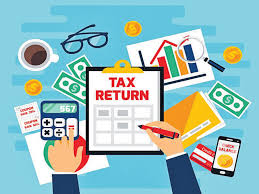Dear Folks
Hope You all are Doing well during this Pandemic!
In this write up I am sharing with you all, Pre-Requisites of Filing Income Tax Return of an Individual Specifically for the financial year 2020-2021. All taxpayers must be ready with their Interest Certificates, Form-16 and other essential documents but there are still few important points which skipped by an Individual if he/she himself filing the return.
We should be careful while filing our ITR Not Just because of taxation or penal provision there could be other proceedings as well, this year the original due date was July 31, however, it was extended by govt. due to nationwide issue of COVID-19 till 31st December, 2021
Let’s just brighten up your screen and begin with your checklist for the Income-tax Return ITR for the financial year.
- One is liable to file ITR even if no tax dues:
Once you start earning, being a responsible citizen, one must file their Income-tax return.
Generally, a taxpayer believes that he isn’t liable to file a tax return since there is no tax liability pending during the financial year. It should be kept in mind that ITR has to be filed irrespective of the fact whether the tax is required to be paid or not. Generally, in case of individuals what triggers the liability for filing of ITR is the fact that the gross total income of the assessee is more than the maximum exemption limit.
- Different Categories of Individual Taxpayers:
There are three different categories of taxpayers in India as per there age and financial status.
| 1. Individuals who are below the age of 60 years, including residents as well as non-residents |
| 2. Resident senior citizens who are 60 years and above but below 80 years of age |
| 3. Resident super senior citizens who are above 80 years of age. |
- Most Important -You Must have Correct set of Information and documents.
| 1 | PAN of Individual. |
| 2 | Aadhar of Individual |
| 3 | Mobile Number and Email |
| 4 | TDS Certificates (if any) |
| 5 | FORM-16 (if any) |
| 6 | Bank Statements (Interest Part Mainly) |
| 7 | Proof of Investment in 80C, 80CC, 80CCD (if any) |
| 8 | Document Regarding Medical Insurance (if any) |
| 9 | Loan Documents (if any) |
| 10 | Investment Statement of SIP, Derivatives, Commodities etc. (if any) |
| 11 | Rent Receipts (if any) |
| 12 | Proof relating to other sources of income (if any) |
- Choice of Income Tax Form as per the Income sources.
Since there are multiple Forms of return notified by the tax authorities. Out of these, ITR 1 to 4 apply to individuals/HUFs, while ITR 5 is for Partnership Firms and LLP, ITR 6 is for Companies other than those claiming exemptions (See Rule 12) and ITR 7 is for [For persons including companies required to furnish return under section 139(4A) or section 139(4B) or section 139(4C) or section 139(4D (Please see rule 12 of the Income-tax Rules). Therefore, the correct form needs to be filled in.
The ITR Form and corresponding incomes are listed below:
| ITR 1 – Salary Income, House Property Income and Income from Other Sources (Interest income, Winnings from lottery etc.) |
| ITR 2 – Salary Income, House Property Income (more than one House Property), Capital Gain Income, Income from Other Sources, Agricultural income up to Rs .5000 |
| ITR 3 – Salary Income, House Property Income (more than one House Property), Capital Gain Income, Income from Other Sources, Proprietorship Business Income, Professional income, Partnership income and agricultural income more than Rs.5000 |
| ITR 4 S- Individuals opted for the presumptive income scheme as per Section 44AD, Section 44 ADA and Section 44AE of the income tax act. |
A Pro Tip: ITR-1 cannot be filed by a taxpayer who is a Director in a company or who has held investments in unlisted equity shares at any time during the financial year. Such taxpayers will have to use ITR-2 or ITR-3 form for FY2021.
- Determination of residential status:
What is to be included in the total income of the assessee is greatly influenced by his residential status in India. Total Income of an assessee cannot be computed unless his residential status is determined as per provisions of the Income Tax Act.
The residential status of each person shall be determined separately as per the set of rules prescribed for the relevant category of person. For example, the residential status of an individual is determined based on his number of days of stay in India.
- Check TDS and TCS information by downloading Form 26AS:
Now, the ITRs are linked with the Form 26AS, resulting in prefilled information in the ITRs relating to form 26AS. But for a safer side, it is advisable to cross verify the information as reflecting in Form 26AS with that of the information in the ITRs. Before filing the return every assessee should verify the credits in the 26AS form to ensure that the return filed is free from error.
A Pro Tip: if you are claiming a refund, make sure that the bank details provided are accurate so that you receive your refund smoothly. Also, you have to report all bank account details held by you except dormant accounts (accounts which are inactive for the past three years).
- Benefits of filing ITR on time:
| File your return on time without errors to avoid penalty up to Rs.10,000 under section 234F. |
| If you don’t file the return on or before the due date, the rate of 1% will be charged every month, or part of the month, on the amount of tax remaining unpaid as per section 234A. |
| Carrying forward of the losses is not allowed if you don’t file the return on or before the due date. You will be deprived of carrying forward your losses for set off against your income in the next years. |
A Pro Tip: Every individual shall keep safe custody of all the documents relating to the deductions claimed to avoid further inconvenience during the proceedings. Such documents include the deductions claimed under Section 80C, Section 80D etc.
- E-verification of Income-tax return -ITR:
Make sure that the return is e verified within 120 days. You can also send the signed acknowledgement to the income tax CPC office if you are not able to e verify the same. Your return won’t be processed unless you e verify. The return filed but not e-verified will be treated as an invalid return.
As a Concluding note of this write-up -Review your income tax return, having incorrect information in your filing will slow down the receipt of your tax refund. Check all numbers and do double calculations, as these are the most common mistakes of tax filers. Ensure your figures tally without any discrepancies.
Explanation Regarding Filing of ITR of Salary Class Individual.
1. Form 16-
For all salaried individuals, Form 16 is the most important document for filing the ITR. This document is issued by the employer to its employees. It is a mandatory document and every employer is liable to issue Form 16 to all its employees from whom income tax has deducted from their salaries. It is a tax deducted at source (TDS) certificate and carries the details of the salary paid to the employee and their TDS.
Now what you must know about Form 16 is that it consists of two parts – Part A and B. Part A is the portion that consists of the income tax deducted by the employer in the financial year. Separately, it has the Permanent Account Number (PAN) details of the employee and the Tax Deduction Account Number (TAN) of the employer. Part B of Form 16 includes the break-up information of the employee’s gross salary.
2. Certificates related to interest income
Apart from the income from salary, an individual gets income from various interest investments such as savings account deposits and fixed deposits from banks and post office. These financial institutions provide interest certificates/bank statements to their depositors for the same. An individual can claim deduction under section 80TTA of the Income Tax Act up to Rs 10,000 on the interest earned from their savings account held with a bank/post office.
3. Tax Saving Investments
Those individuals who could not submit their tax-saving investments to their employers during the stated period in the previous financial year will now have to submit the proof of the same directly to the Income Tax (I-T) Department for claiming tax deductions.
These include receipt of life insurance (LIC) premium paid, receipt of medical insurance, Public Provident Fund (PPF) passbook, 5-year FD receipts, mutual funds investment (ELSS), home loan repayment certificate/statement, donation paid receipt, tuition fee paid receipt etc.
Originally Published on – Compliance Calendar LLP


faltbare ballerinas otterbox iphone 7 plus mobile phone hoesje youth lakers jersey kuzma kate hill overnight torba kendall and kylie iphone 6 cases multi pocket rugzak cath kidston
gotosubic [url=https://www.gotosubic.com/]gotosubic[/url]